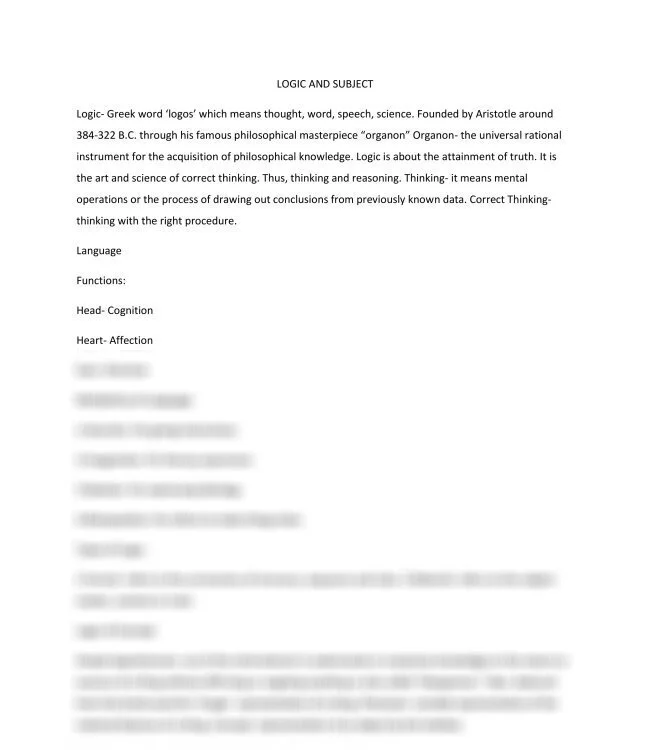LOGIC AND SUBJECT (All -If -It -Logical -Premise -combination -it -re-expressing -these -two 1.First 1.Formal- 1.Genus- 1.Heuristic- 1.Identical 1.Identification- 1.Nominal 1.Passion- 1.Real- 1.Recipr
LOGIC AND SUBJECT (All -If -It -Logical -Premise -combination -it -re-expressing -these -two 1.First 1.Formal- 1.Genus- 1.Heuristic- 1.Identical 1.Identification- 1.Nominal 1.Passion- 1.Real- 1.Recipr
(All -If -It -Logical -Premise -combination -it -re-expressing -these -two 1.First 1.Formal- 1.Genus- 1.Heuristic- 1.Identical 1.Identification- 1.Nominal 1.Passion- 1.Real- 1.Reciprocal 1.Simple 1.Singular- 1.Substance- 1.Univocal 10.Legal- 11. 2.Biverbal 2.Contradictory- 2.Equivocal 2.Imaginative- 2.Logical- 2.Material- 2.Partial 2.Particular- 2.Quantity- 2.Real 2.Reciprocal 2.Second 2.Specific 2.Time 3.Analogous 3.Concrete- 3.Contrary- 3.Descriptive- 3.Dictum 3.Etymology- 3.Ideation- 3.Imaginary- 3.Quality- 3.Spatial 3.Species- 3.Universal- 384-322 3rd 4.Abstract- 4.Causal- 4.Collective- 4.Dictum 4.Manipulative- 4.Position- 4.Privative- 4.Property- 4.Relation- 5.Absolute- 5.Accident0 5.Activity- 5.Lexical- 5.Posession- 5.Relation- 6.Theoretical- 7.Persuasive- 8.Denotative- 9.Connotative- A-O AND According Affection All Apprehension- Aristotle B.C. Categorical- Categories/Predicaments- Categories/Predicaments: Classification Cognition Complete Comprehension/Connotation- Concept Concept- Concept: Conclusion- Conclusion. Contradiction Contradictories Contradictories: Contraposition Contraries Contraries: Conversion- Conversion: Copula: Correct Deduction- Definition- Designated Difference- Direction E-I Eduction- Every Extension/Denotation- Extension/quantity: Formula: Founded Functions: Greek Guts- Head- Heart- Homologous Hypothetical- Idea- Identity Identity- Immediate- Inference- Intellect. Intention- Inversion It Language Language: Latin Law Laws Logic Logic- Logic: Logical Major Meaning: Mediate- Middle Minor Model: Multiplicity NO No Non-Identity- Not Nullo- Object: Obversion Omne- Organon- P P) P- P-Some P; Phantasm- Predicables- Predicate: Premise- Principles Reasoning Relation: S S. SUBJECT Scientific- Second Simple Simple: Some Steps Steps: Sub-Alterns Sub-Alterns: Subcontraries Subcontraries: Subject: Term- Terminus Terms- Terms: The Thinking- Thus, Types Types: Usually When Word- a about according acquisition act activity actuality affirmative affirmative. affirmed affirming agent. agreement all alluding also an analysis and another another. any anything applicable applied applied. are argument around arrives art as assertion assessing assessment at attainment attitudes attribute attributes be belong between both but by called can cannot categorical cause. certain change change. changed changing characteristic. characteristics circumstantial class. classifications collection complete composed comprehension comprises concept. concepts concepts. conceptual conclusion conclusion, conclusion. conclusions conclusive conjunction connection consequence considered consisting contain containing contains content contingency. contradictory conventional converse. conversion copula correct correctness data. de deduced deductive definite derived designated dictionary. differ difference. different differentiating direct directly disagreement. distinctive do does done doubtful doubtful. drawing each either element- element. employed enclose endowed engendering enumerates essence essences. essential every evidence. exactly example. existential existing expresses expressing expression extension extension. external extremes extrinsic fabrication false false. famous fantasy. feature features features. five for form form. found four from genus given giving greater group has have having highest his homogenous how human idea identical ideology if image. in indefinite independent individual individuals influence influencing instructions instrument interchanging involve is it its judgment judgment. knowledge knowledge. known last law. learning least level limits. listeners. literacy location logical major make manifestation masterpiece material matter, may meaning meanings. means mediation medium. mental mind mind. minds. minor nature natures necessity. negated negates negating negative negative. new no non-P non-P. non-S non-S. non-identical, not number object object/quality objective objects obversion obversion. occurrence, occurrence. occurrences. occurs of on one only operation operation. operations opposite opposites or order origin original other other. others others. our out outfit part particular particulars partly parts passes perfection perfection. philosophical posit positive preceded predicate predicate. premise premise. premises. present previously procedure. process process. properties proportions proposition proposition. proposition; propositions provides put qualities/elements quality quality. quantities. quantity quantity. rational re-expresses reality reality. reasoning. reception reference refers relationship remains rendered represent representation restating results reveals right rules. same science science. sensible sequence siLOGIC sign signified. signifies signify signs, single six so some something space. specific specific. specified speech, springs statement stems structure, subject subject. subjects. substance substance. substance’s sum-total surface, syllogism. symbol synonymous synonyms. term term- term. terms terms, than that the then theory. therefore therefore, thing thing. things thinking thinking. third thought, thoughts three through time to true true. truth truth. two unchanged. understand understands understood unit. universal universally use uses verbal/logical w/ w/3rd w/out we what when. wherein which whole(posture). whole. with within without word word, x ‘Image’- ‘M.’ ‘P.’ ‘S.’ ‘logos’ “Definire”- “Ideogenesis.” “Syllogism.” “but” “organon”
LOGIC AND SUBJECT
Logic- Greek word ‘logos’ which means thought, word, speech, science. Founded by Aristotle around 384-322 B.C. through his famous philosophical masterpiece “organon” Organon- the universal rational instrument for the acquisition of philosophical knowledge. Logic is about the attainment of truth. It is the art and science of correct thinking. Thus, thinking and reasoning. Thinking- it means mental operations or the process of drawing out conclusions from previously known data. Correct Thinking- thinking with the right procedure.
Language
Functions:
Head- Cognition
Heart- Affection
Guts- Direction
Multiplicity of Language:
1.Heuristic- for giving instructions
2.Imaginative- for literacy expression
3.Ideation- for expressing ideology
4.Manipulative- for others to make things done
Types of Logic:
1.Formal- refers to the correctness of structure, sequence and rules. 2.Material- refers to the subject matter, content or truth.
Logic of Concept
Simple Apprehension- act of the mind wherein it understands or comprises knowledge on the nature or essence of a thing without affirming or negating anything or also called “Ideogenesis.” Idea- deduced from the Greek word for ‘Image’- representation of a thing. Phantasm-
